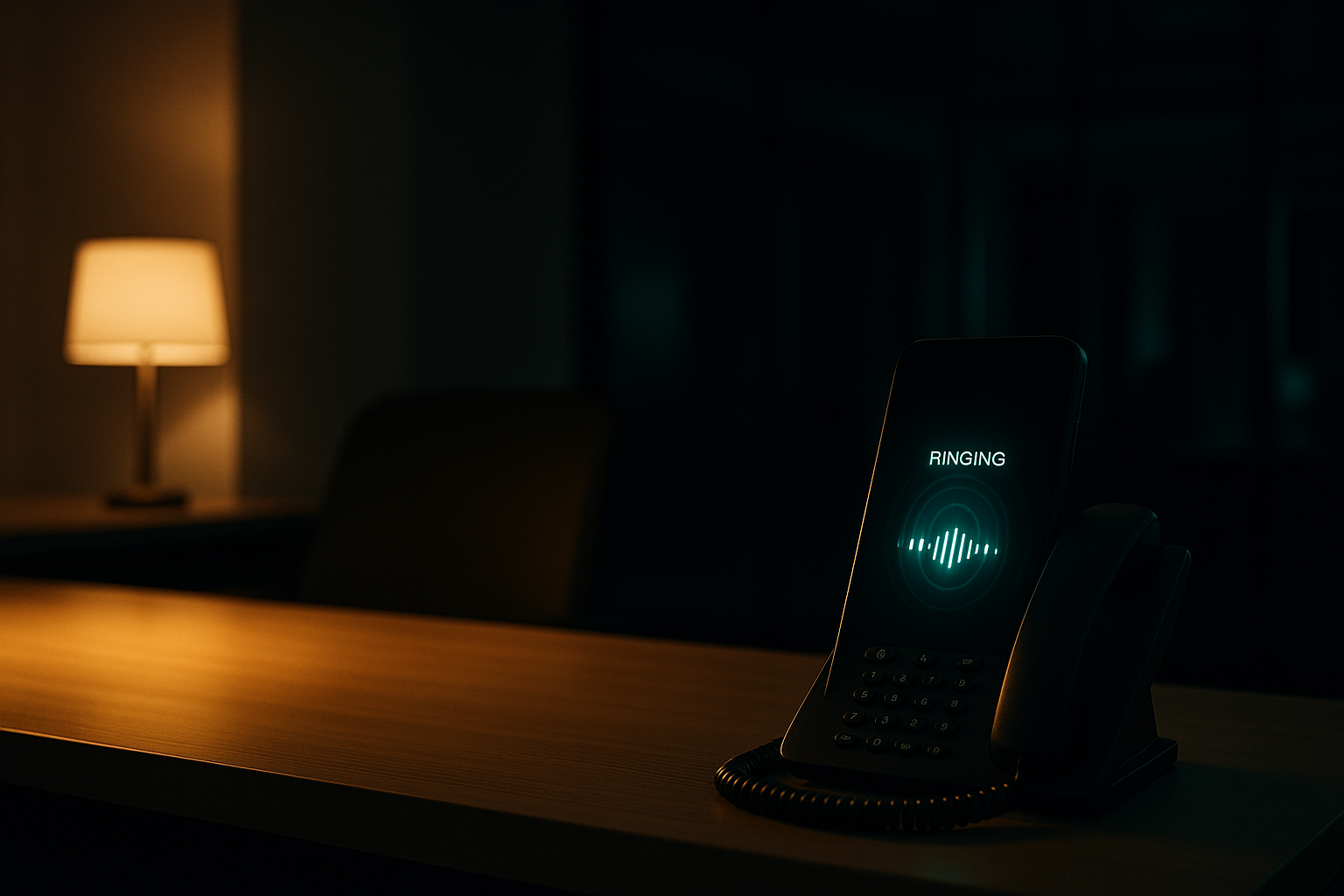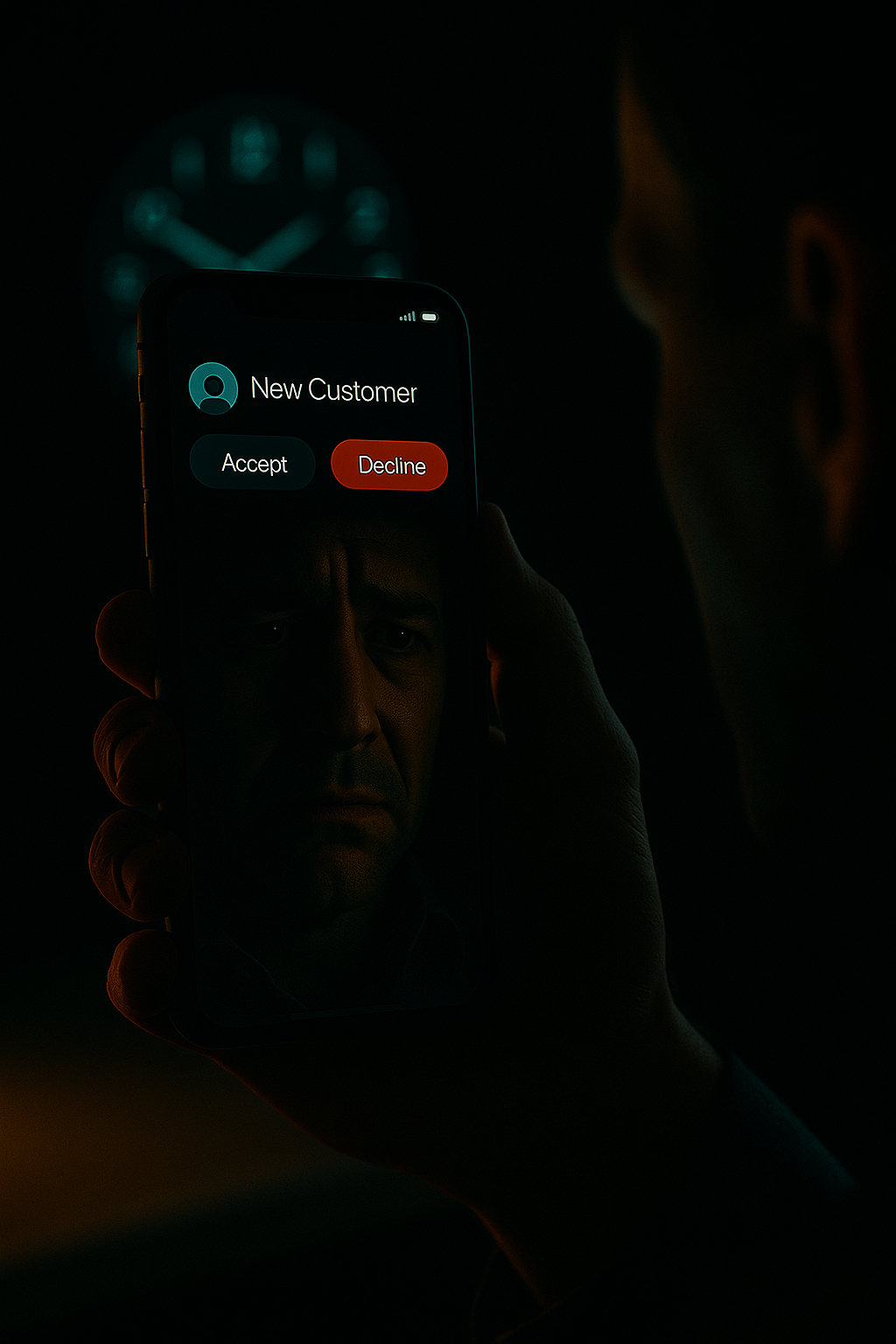You're Probably Scared to Implement AI (Here's Why You Shouldn't Be)

I get it.
You've seen the articles. The Twitter threads. The LinkedIn posts warning about AI going wrong. Customer service disasters. Chatbots that can't understand simple questions. Robots that sound... well, like robots.
So when someone tells you to put an AI receptionist on your business line — the phone number people call when they need help, when they're stressed, when they're ready to spend money — your gut reaction is hell no.
I don't blame you.
But here's what I need you to understand: that fear is costing you more than you think. And the thing you're afraid of? It's not actually the problem anymore.

It's 3AM, and another missed call sits in voicemail. The fear feels real — but the real cost is invisible.
Let me explain.
The Fear Is Real (And Totally Valid)
Every business owner I talk to has the same concerns. They don't always say them out loud, but I can see it in their face when I mention AI:
"What if it sounds robotic and turns people off?"
"What if it can't handle real questions and customers get frustrated?"
"What if people feel tricked when they realize it's not human?"
"What if it screws up and I lose a huge lead?"
These aren't irrational fears. They're smart business concerns. You've built your reputation on real relationships and quality service. The last thing you want is some soulless robot answering your phone and ruining that.
I've had these exact same fears. Hell, I still think about them every single day — because I'm the one building this thing, and if it fails, it's on me.
But here's what changed my mind, and what I think will change yours too.
The Problem Isn't AI Anymore
Five years ago? Yeah, AI receptionists were terrible. Stiff. Scripted. Couldn't handle anything off-script. Everyone could tell immediately.
But we're not in 2020 anymore.
The technology has completely changed. And I mean completely.
I'm going to be straight with you: modern conversational AI — when it's done right — sounds more natural than most human receptionists I've talked to. Not because humans are bad at their jobs, but because AI doesn't have bad days. It doesn't forget to smile through the phone. It doesn't get tired at 4:45pm on a Friday.
But here's the catch: "when it's done right" is doing a lot of heavy lifting in that sentence.
Most AI receptionist companies don't do it right. They give you software, some generic templates, and say "good luck." The result? Yeah, it sounds like AI. It's obvious. It's awkward. And customers hang up.
That's not an AI problem. That's a lazy implementation problem.
What Actually Matters to Your Customers
Here's something that surprised me when we started really analyzing calls:
"Customers don't actually care if it's AI."
I know, I know. That sounds crazy. But hear me out.
What they care about is:
Can you help me right now?
Do you understand my problem?
Are you going to waste my time?
Do you actually care?

What customers really want: someone to listen, understand, and help right away.
That's it. That's the whole list.
When someone calls your business with a burst pipe at 10pm, they're not thinking "I hope a human answers." They're thinking "please, someone help me fix this before my house floods."
If your AI picks up on the first ring, understands the urgency, provides immediate helpful advice ("turn off the main water valve — it's usually near your water heater"), books them for first thing in the morning, and sends a confirmation text with emergency tips... they don't care that it wasn't human.
They care that you helped them immediately.
Meanwhile, your competitor's voicemail is telling them "our office hours are Monday through Friday, 9-5."
Guess who gets the job?
The Three Calls That Changed My Mind
Let me tell you about three real calls that happened in our system. These aren't cherry-picked success stories. This is just last week.
Call #1: The Skeptical Contractor
A general contractor called one of our HVAC clients at 6:30am. Job site emergency — no heat, crew showing up in an hour, freezing cold.
Our AI picked up: "Hey, thanks for calling [Business]. What's going on?"
He explained the situation, clearly stressed.
The AI responded: "Okay, that sounds urgent. I'm so sorry you're dealing with this. Let me get someone out there as soon as possible. Where's the job site?"
Booked him for 7:30am. Sent a confirmation text. Done.
At the end of the call, he said: "Wow, you guys are on it. I called two other places and got voicemail."
He never once questioned if he was talking to AI. Because it didn't matter. We helped him instantly.
Call #2: The Confused Homeowner
Elderly woman called a dental practice, clearly in pain, but confused about insurance and whether they took her plan.
The AI slowed down. Asked clarifying questions. Explained that they'd verify her insurance when she came in, but could get her seen today regardless.
She said, "Oh honey, thank you so much. You're so patient with me."
Honey. She called the AI honey.
Because it treated her with genuine care and didn't rush her off the phone.
Call #3: The One That Got Personal
Young mom called a pediatric dentist, kid screaming in the background. She was frazzled, apologizing for the noise, clearly at her wit's end.
Our AI said: "Please don't apologize! I totally understand. Let's get you both in as soon as we can. It sounds like they're really uncomfortable."
The mom actually started crying. She said: "Thank you for being so nice. I've been calling places all morning and everyone's been so short with me."
That call broke me, honestly. Because this AI — this thing I built — somehow made a stressed mom feel heard and cared for when actual humans at other offices couldn't be bothered.
That's when I realized: this isn't about replacing humans. It's about being there when humans can't be.
The Real Risk Isn't AI
Here's what nobody talks about:
The risk isn't using AI.
The risk is NOT using it.
Every single day you don't have 24/7 coverage, you're losing leads to competitors who do. Every weekend call that goes to voicemail is someone who's going to book with the business that actually answered.
And here's the kicker: some of those businesses answering? They're already using AI. You just don't know it.
Because when it's done well, you can't tell. And even when you can... customers don't care as long as they're getting helped.
The business landscape has changed. Customer expectations have changed. Five years ago, people accepted that they might have to wait until Monday morning to book something. Now? They expect instant answers, instant booking, instant help.
If you can't provide that, someone else will.
Why ReceptMe Is Different (And Why It Matters)
I'm not going to pretend every AI receptionist is created equal. They're not.
Most companies build software and walk away. That's why their AI sounds robotic. That's why it can't handle real conversations. That's why businesses are scared to use it.
We do it completely differently.
When you sign up with ReceptMe, I personally get on a call with you. I learn how you talk to customers. What questions they usually ask. What makes your business different. Your actual personality.
Then I write custom scripts that sound like YOU. Not like "professional AI assistant." Like you.
We test it together. Role-play real scenarios. I listen to your first week of calls and tune anything that sounds off. And I keep optimizing it every single week based on what I'm seeing in your calls.
The result? An AI that doesn't just answer questions. It has conversations. It shows empathy. It provides actual help.
And when someone's calling at 9pm on a Saturday, stressed and needing help, they get immediate assistance from something that sounds and feels like your best receptionist — because I literally trained it to be.
The Question You Should Be Asking
The question isn't "what if customers can tell it's AI?"
The question is: "what happens if they can't reach me at all?"
Because that's the reality right now. Calls going to voicemail. Customers booking with competitors. Revenue disappearing while you're busy doing the actual work.
AI isn't perfect. But it's answering calls. It's booking appointments. It's capturing leads you're losing right now.
Is it better to have a perfectly natural-sounding AI available 24/7, or a human receptionist who goes home at 5pm while leads call your competitor?
Is it better to have AI providing empathetic help during an emergency call at midnight, or voicemail telling them to call back Monday?
The fear of AI sounds reasonable until you count the cost of NOT having it.
What I Wish Someone Had Told Me
When I started building ReceptMe, I was terrified it wouldn't work. That businesses would hate it. That customers would feel tricked.
But you know what actually happened?
Customers got help when they needed it. Businesses stopped losing leads. Revenue went up. Nobody complained about AI — they complimented how responsive and helpful the business was.
Because at the end of the day, people don't call your business to chat with a human. They call to solve a problem. Get a question answered. Book an appointment.
If your AI can do that instantly, naturally, and helpfully... they're happy.
And you're not lying awake at night wondering how many leads you lost today.
Try It (I Dare You)
Look, I can write blog posts all day about why AI receptionists work. But the only way you'll actually believe me is if you experience it yourself.
So here's what I want you to do:
Call your business right now. Listen to that ringing. Count how long it takes before someone picks up (or doesn't). Notice how it feels.
Then imagine every single call — morning, noon, night, weekend, holiday — getting answered on the first ring by someone who sounds natural, caring, and genuinely helpful.
Imagine never missing a lead again.
Imagine waking up to a calendar full of booked appointments from calls that came in overnight.
Imagine your competitors still using voicemail while you're capturing every single opportunity.
That's not a fantasy. That's what our clients are experiencing right now.
The only thing standing between you and that reality? The fear of trying something new.
And honestly, that fear costs way more than the monthly subscription ever will.
P.S. — Still skeptical? Good. You should be. That's why I personally do every demo call. I want you to hear it, test it, and see if it's right for your business. No pressure, no gimmicks. Just real conversations about whether this actually makes sense for you.
